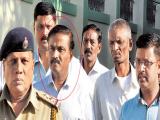Bengaluru, Jan 4: More assets linked to the suspended chief project officer of the State Highway Development Project, S C Jayachandra, have been unearthed. Documents accessed by DH show that the officer has acquired assets in his mother-in-law's name. One of the major assets is a 15-acre, 10-gunta plot of land at Antarasanthe near Kabini in Mysuru district and four sites in Harohalli near Yelahanka in the city.
 This apart, Jayachandra's wife Bharathi Jayachandra was inducted as one of the additional directors in Jivin Green Realty Pvt Ltd in 2014-15. Bharathi Jayachandra, along with one Pokar Ram and D M Chandresh, was appointed as additional directors at the board meeting held on September 17, 2015. During the financial year-end, March 31, 2016, the promoters and directors of this company Rama Sudarshan and Sudarshana Kavi Shivaraman, resigned. The profit and loss account for the year ending March 31, 2015, reveals the net loss for the year under review as Rs 10.25 lakh as against the profit of Rs 4.65 lakh in the previous year.
This apart, Jayachandra's wife Bharathi Jayachandra was inducted as one of the additional directors in Jivin Green Realty Pvt Ltd in 2014-15. Bharathi Jayachandra, along with one Pokar Ram and D M Chandresh, was appointed as additional directors at the board meeting held on September 17, 2015. During the financial year-end, March 31, 2016, the promoters and directors of this company Rama Sudarshan and Sudarshana Kavi Shivaraman, resigned. The profit and loss account for the year ending March 31, 2015, reveals the net loss for the year under review as Rs 10.25 lakh as against the profit of Rs 4.65 lakh in the previous year.
Two long-term loans, Rs 7.56 crore for 2014-15 and Rs 2.55 crore for 2013-14, have been mentioned in the balance sheet. They are mentioned as loan from directors. However, there are no details about the names of the directors and against what security the loans were given by the directors. The consolidated amount, around Rs 9.84 crore, has been used to purchase land. Sources said the probe is on to trace the source of the money which has been diverted to the company in the name of loans.
Sources said there are several assets in the name of Jayachandra's mother-in-law. The officials are, however, still verifying the source of income with which the officer's mother-in-law purchased lands in Antarasanthe near Kabini in H D Kote in Mysuru district. More than 15 acres of land was purchased in 2012 and the property also borders the land acquired for the Kabini reservoir rehabilitation package.
A source said that the officer was planning to construct a resort on the land. This apart, she bought four different sites ranging from 9 guntas to 11 guntas, in 2007. However, sources said that of these sites, the officer's mother-in-law sold two sites within a year.






Comments
Lucky mother in law and shameless son in law...
Add new comment